Europe
Berlin becomes refuge for LGBTQ Ukrainians
Dmitry Shapoval swam across river to flee Ukraine
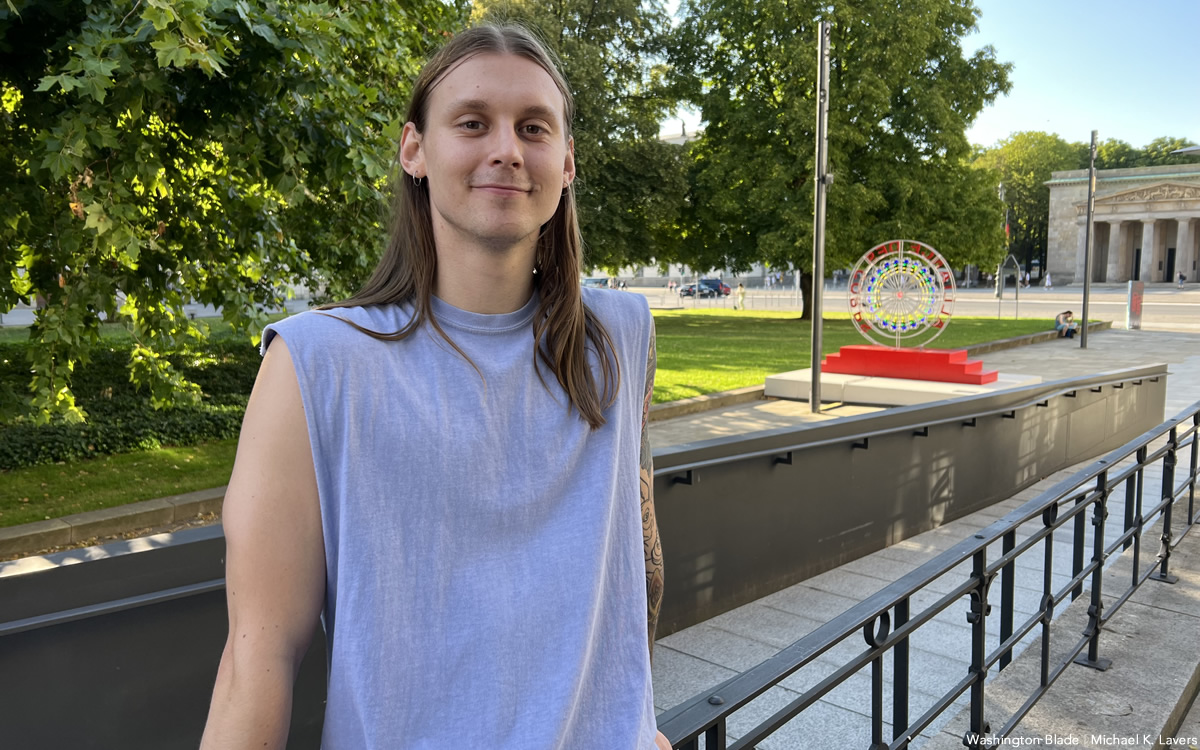
BERLIN — Dmitry Shapoval is a 24-year-old gay man from Ukraine who lives with HIV.
He was working at an IT company’s call center and studying web and UX design in Kyiv, the Ukrainian capital, in February when Russia launched its war against his country. Shapoval swam across a river and entered Poland less than a month later.
Shapoval now lives in Berlin with his cat Peach and has begun the process of resettling in Germany.
“I feel very secure here,” Shapoval told the Washington Blade on July 22 during an interview at Berlin’s Palais Populaire by Deutsche Bank on the city’s Unter den Linden boulevard.
Shapoval is one of the more than 900,000 Ukrainians who have arrived in Germany since the war began.
Ukrainians are able to enter Germany without a visa, and the German government provides those who have registered for residency a “basic income” that helps them pay for housing and other basic needs that include food. Ukrainian refugees can also receive access to German language classes, job training programs and childcare.
Anastasiia Baraniuk and her partner, Yulia Mulyukina, were living together Dnipro, a city on the Dnieper River in central Ukraine, when the war began.
Mulyukina, who is from Russia, was living in Moscow when she and Baraniuk began to talk online. Mulyukina traveled to Lviv in western Ukraine via Istanbul to meet Baraniuk, who is a Ukrainian citizen.
Mulyukina on July 22 told the Blade at Palais Populaire that she asked the Russian Embassy in Kyiv for help when the war began. Mulyukina said officials suggested that she “ask Ukraine what to do.”
“I was really shocked that my own country, with this idea of bringing peace, bringing quiet to Ukraine, just rejected me entirely,” she said in Russian as Shapoval translated.
Baraniuk, who also spoke with the Blade in Russian, said the Ukrainian government and a local NGO provided them with food and money.
The couple had planned to stay in Ukraine, but they decided to leave after Mulyukina “heard five explosions” while she was walking to a store. The two women’s friends gave them money to buy train tickets to Poland.
Insight, a Ukrainian LGBTQ and intersex rights organization, helped Baraniuk and Mulyukina and their cat enter Poland. They spent a week there before they arrived in Berlin on April 28.
Shapoval met them when they arrived at the train station.
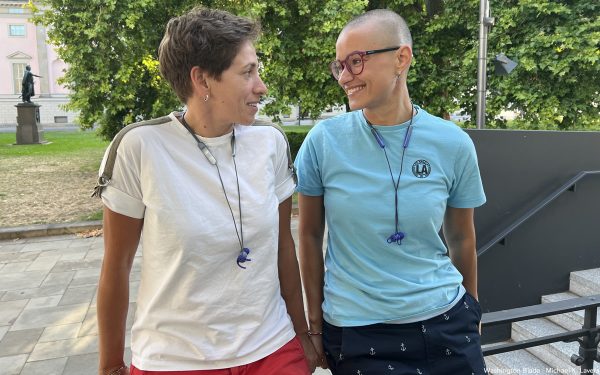
Shapoval, Baraniuk and Mulyukina are among those who attended a reception that took place at the end of a two-day meeting the Organization for Refuge, Asylum and Migration organized that took place in Berlin from July 21-22.
Activists from Ukraine, Germany, Poland, Romania, Moldova, Slovakia, the Czech Republic, the Netherlands, Italy and the U.S. attended the gathering that had a stated goal of starting “the conversation about long-term/mid-term needs and solutions for LGBTIQ Ukrainians and incite collaboration among stakeholders working with LGBTIQ Ukrainians and third-country nationals.”
“We were thrilled to bring together activists and human rights defenders from 10 countries and 20 organizations to develop medium and long-term strategies to support displaced LGBTIQ Ukrainians and third country nationals,” ORAM Executive Director Steve Roth told the Blade after the meeting. “All these organizations, including ORAM, have done an amazing job getting emergency support and services to LGBTIQ Ukrainians in need. As the war in Ukraine drags on, it’s more important than ever for organizations to coordinate efforts and plan for supporting longer term needs. This two-day roundtable in Berlin was a great step in that direction.”
ORAM has partnered with Airbnb.org and Alight (formerly known as the American Refugee Committee) to provide more than 1,000 nights of short-term housing to LGBTQ and intersex Ukrainians and other displaced people in Germany and other countries in Europe. Shapoval, Baraniuk and Mulyukina are among those who live in such apartments.
Roth noted ORAM has begun to develop “a housing collective” for LGBTQ and intersex Ukrainians in Berlin. He said ORAM rents the apartments in which the refugees can live for up to six months, “allowing them to register in Berlin, access social welfare and other services.”
“Safe and secure housing is one of the most urgent needs facing displaced LGBTIQ Ukrainians,” Roth told the Blade. “It’s an essential element in getting settled and rebuilding lives.”
Berlin Pride shows solidarity with Ukraine
The meeting ended a day before the annual Christopher Street Day parade took place in Berlin.
Baraniuk helped carry ORAM’s banner during the parade, while Mulyukina took pictures for the organization.
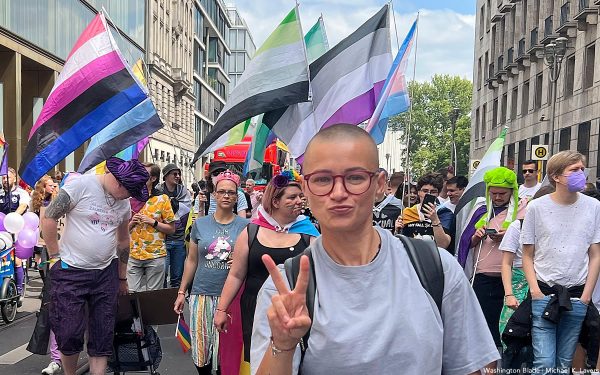
‘Stop Russian aggression’
Kyiv Pride Executive Director Lenny Emson is one of LGBTQ and intersex activists from Ukraine who participated in the ORAM meeting and in the parade.
He told the Blade before the parade began that he took several trains from Kyiv to Poland before he flew to Berlin. Emson said the trip took two days.
“I understand that it is a safe ground, but I still have those flashbacks,” Emson told the Blade as he smoked a cigarette in front of a hotel near the parade staging area. “When you were sitting in the conference room and I saw something that reminds me of an air raid siren I was getting a panic attack. It doesn’t matter if you’re in a safe place.”
Emson also took issue with parade organizers’ opposition to war.
“Unfortunately, we as the Ukrainian community here (are) very disappointed with the motto that Berlin Pride put on the main stage: No war,” said Emson. “This doesn’t reflect the feelings that we have right now.”
“We would like to actually say it loud: Stop Russian aggression,” he added. “We need action right now. We need to stop it. We need to stop Russian aggression. We need to stop it right now.”
A group of marchers held a blue and yellow — the colors of Ukraine’s flag — banner that read “Arm Ukraine: Make Pride in Mariupol possible” while others simply carried the Ukrainian flag.
A man carried a homemade sign that read “Arm Ukraine: Make Pride in Kyiv, Kharkiv, Odesa, Zaporizha, Kryvyi Rih possible again.” Viktoriya, a woman from northern Ukraine who is now pursuing her PhD in Berlin, held a cardboard poster that noted her homeland’s “queer soldiers are fighting for all of us.”
“I’m marching for both rights of queer people and rights of Ukrainians: The right to live and the right for love,” she said as she marched towards Potsdamer Platz in the center of Berlin.
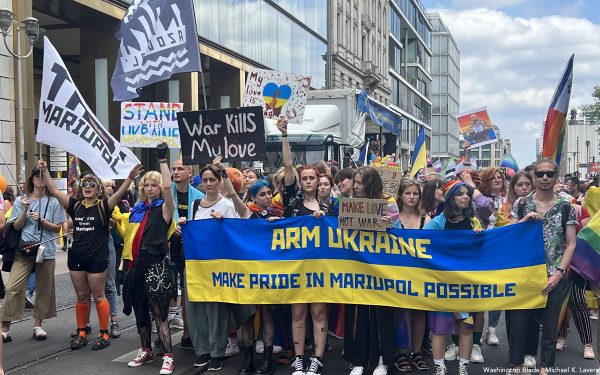
Discrimination and violence based on sexual orientation and gender identity was commonplace in Ukraine before the war.
Ukrainian President Volodymyr Zelenskyy last year pledged his country would continue to fight anti-LGBTQ and anti-intersex discrimination after he met with President Joe Biden at the White House.
Shapoval, who is dating a man he met last October when he traveled to Berlin, told the Blade that he received “looks” in Kyiv if he wore a pink shirt.
He was wearing a pair of purple sneakers during the interview. Shapoval said he would not have been comfortable wearing them if he were still in Kyiv.
“For me it was even harder because I had misery in Ukraine because of homophobes,” he said. “Even the gay community is so toxic in Ukraine because it’s all about toxic masculinity and all of that … I also had some experiences where gays were like, ‘Oh my gosh just cut your hair and then we will get in touch with you.'”
Shapoval has begun the process of applying for German residency.
“I fell in love with the city right from the beginning,” he said. “I found friends here.”
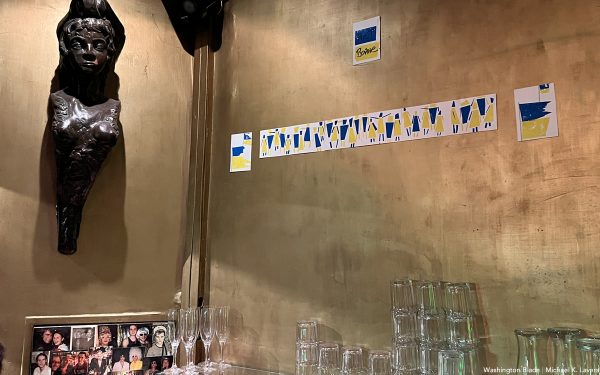
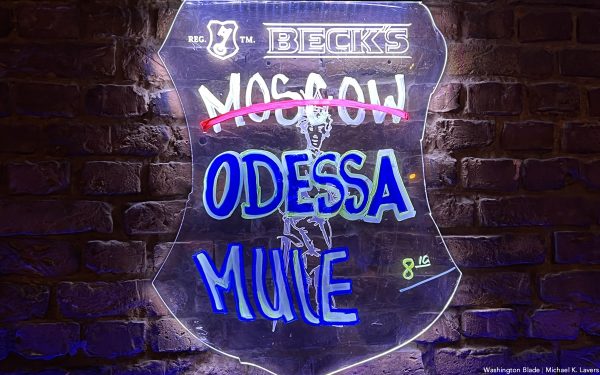
Jessica Stern, the special U.S. envoy for the promotion of LGBTQ and intersex rights, and others have noted transgender and gender non-conforming Ukrainians have not been able to leave the country because they cannot exempt themselves from military conscription. Another issue that LGBTQ and intersex Ukrainians have faced as they attempt to resettle in another country is the lack of legal recognition of their relationships.
A marriage equality petition that Kyiv Pride submitted to Zelenskky on July 12 received more than 28,000 signatures, which is higher than the threshold that requires him to consider it. Ukrainian law requires Zelenskky to respond to it within 10 days of receiving it.
Baraniuk and Mulyukina hope to resettle in the U.S. and Canada, but are unable to legally prove they are in a relationship. The U.S. has a marriage-based immigration system for bi-national couples, while the Canadian system requires them to be married or “common-law partners.”
The U.S. has approved Baraniuk’s resettlement request, but denied Mulyukina.
They said the process to legally prove they are together is prohibitively expensive.”Right now we are looking for a way to get the proof that we are a couple,” said Baraniuk. “We don’t want to stay in Berlin.”
Books
New book profiles LGBTQ Ukrainians, documents war experiences
Tuesday marks four years since Russia attacked Ukraine

Journalist J. Lester Feder’s new book profiles LGBTQ Ukrainians and their experiences during Russia’s war against their country.
Feder for “The Queer Face of War: Portraits and Stories from Ukraine” interviewed and photographed LGBTQ Ukrainians in Kyiv, the country’s capital, and in other cities. They include Olena Hloba, the co-founder of Tergo, a support group for parents and friends of LGBTQ Ukrainians, who fled her home in the Kyiv suburb of Bucha shortly after Russia launched its war on Feb. 24, 2022.
Russian soldiers killed civilians as they withdrew from Bucha. Videos and photographs that emerged from the Kyiv suburb showed dead bodies with their hands tied behind their back and other signs of torture.

Olena Shevchenko, chair of Insight, a Ukrainian LGBTQ rights group, wrote the book’s forward.

The book also profiles Viktor Pylypenko, a gay man who the Ukrainian military assigned to the 72nd Mechanized Black Cossack Brigade after the war began. Feder writes Pylypenko’s unit “was deployed to some of the fiercest and most important battles of the war.”
“The brigade was pivotal to beating Russian forces back from Kyiv in their initial attempt to take the capital, helping them liberate territory near Kharkiv and defending the front lines in Donbas,” wrote Feder.
Pylypenko spent two years fighting “on Ukraine’s most dangerous battlefields, serving primarily as a medic.”
“At times he felt he was living in a horror movie, watching tank shells tear his fellow soldiers apart before his eyes,” wrote Feder. “He held many men as they took their final breaths. Of the roughly one hundred who entered the unit with him, only six remained when he was discharged in 2024. He didn’t leave by choice: he went home to take care of his father, who had suffered a stroke.”
Feder notes one of Pylypenko’s former commanders attacked him online when he came out. Pylypenko said another commander defended him.
Feder also profiled Diana and Oleksii Polukhin, two residents of Kherson, a port city in southern Ukraine that is near the mouth of the Dnieper River.
Ukrainian forces regained control of Kherson in November 2022, nine months after Russia occupied it.
Diana, a cigarette vender, and Polukhin told Feder that Russian forces demanded they disclose the names of other LGBTQ Ukrainians in Kherson. Russian forces also tortured Diana and Polukhin while in their custody.
Polukhim is the first LGBTQ victim of Russian persecution to report their case to Ukrainian prosecutors.

Feder, who is of Ukrainian descent, first visited Ukraine in 2013 when he wrote for BuzzFeed.
He was Outright International’s Senior Fellow for Emergency Research from 2021-2023. Feder last traveled to Ukraine in December 2024.
Feder spoke about his book at Politics and Prose at the Wharf in Southwest D.C. on Feb. 6. The Washington Blade spoke with Feder on Feb. 20.
Feder told the Blade he began to work on the book when he was at Outright International and working with humanitarian groups on how to better serve LGBTQ Ukrainians. Feder said military service requirements, a lack of access to hormone therapy and documents that accurately reflect a person’s gender identity and LGBTQ-friendly shelters are among the myriad challenges that LGBTQ Ukrainians have faced since the war began.
“All of these were components of a queer experience of war that was not well documented, and we had never seen in one place, especially with photos,” he told the Blade. “I felt really called to do that, not only because of what was happening in Ukraine, but also as a way to bring to the surface issues that we’d had seen in Iraq and Syria and Afghanistan.”

Feder also spoke with the Blade about the war’s geopolitical implications.
Russian President Vladimir Putin in 2013 signed a law that bans the “promotion of homosexuality” to minors.
The 2014 Winter Olympics took place in Sochi, a Russian resort city on the Black Sea. Russia annexed Crimea from Ukraine a few weeks after the games ended.
Russia’s anti-LGBTQ crackdown has continued over the last decade.
The Russian Supreme Court in 2023 ruled the “international LGBT movement” is an extremist organization and banned it. The Russian Justice Ministry last month designated ILGA World, a global LGBTQ and intersex rights group, as an “undesirable” organization.
Ukraine, meanwhile, has sought to align itself with Europe.
Ukrainian President Volodymyr Zelenskyy after a 2021 meeting with then-President Joe Biden at the White House said his country would continue to fight discrimination based on sexual orientation and gender identity. (Zelenskyy’s relationship with the U.S. has grown more tense since the Trump-Vance administration took office.) Zelenskyy in 2022 publicly backed civil partnerships for same-sex couples.
Then-Ukrainian Ambassador to the U.S. Oksana Markarova in 2023 applauded Kyiv Pride and other LGBTQ and intersex rights groups in her country when she spoke at a photo exhibit at Ukraine House in D.C. that highlighted LGBTQ and intersex soldiers. Then-Kyiv Pride Executive Director Lenny Emson, who Feder profiles in his book, was among those who attended the event.
“Thank you for everything you do in Kyiv, and thank you for everything that you do in order to fight the discrimination that still is somewhere in Ukraine,” said Markarova. “Not everything is perfect yet, but you know, I think we are moving in the right direction. And we together will not only fight the external enemy, but also will see equality.”
Feder in response to the Blade’s question about why he decided to write his book said he “didn’t feel” the “significance of Russia’s war against Ukraine” for LGBTQ people around the world “was fully understood.”
“This was an opportunity to tell that big story,” he said.
“The crackdown on LGBT rights inside Russia was essentially a laboratory for a strategy of attacking democratic values by attacking queer rights and it was one as Ukraine was getting closet to Europe back in 2013, 2014,” he added. “It was a strategy they were using as part of their foreign policy, and it was one they were using not only in Ukraine over the past decade, but around the world.”
Feder said Republicans are using “that same strategy to attack queer people, to attack democracy itself.”
“I felt like it was important that Americans understand that history,” he said.
Netherlands
Rob Jetten becomes first gay Dutch prime minister
38-year-old head of government sworn in on Monday

Rob Jetten on Monday became the Netherland’s first openly gay prime minister.
Jetten’s centrist D66 party won the country’s elections last October, narrowly defeating Geert Wilders’ far-right Party for Freedom.
King Willem-Alexander on Monday swore in Jetten, who is also the country’s youngest-ever prime minister. The Associated Press notes Jetten’s coalition government includes the center-right Christian Democrats and the center-right People’s Party for Freedom and Democracy.
“Proud to be able to do this together,” said Jetten in an X post before Willem-Alexander swore him in.
COC Nederland, a Dutch LGBTQ advocacy group, in a statement said Jetten “becoming prime minister shows that your sexual orientation doesn’t have to matter.”
“You can become a construction worker, a doctor, a lawyer, and even prime minister,” said COC Nederland.
The advocacy group noted Jetten has said his government will implement its “Rainbow Agreement” that include calls for strengthening nondiscrimination laws “to better protect transgender and intersex people,” appointing more “discrimination investigators … to address violence against LGBTQ+ people and other minorities,” and introducing measures “to promote acceptance in schools.”
“COC will hold the Cabinet to that promise,” said COC Nederland.
Jetten’s fiancé is Nicolás Keenen, an Argentine field hockey player who competed in the 2024 Summer Olympics in Paris.
Jetten is one of two openly gay heads of government: Andorran Prime Minister Xavier Espot Zamora came out in 2023. Gay Latvian President Edgars Rinkēvičs, who is the country’s head of state, took office in 2023.
Leo Varadkar, who was Ireland’s prime minister from 2017-2020 and from 2022-2024, and Xavier Bettel, who was Luxembourg’s prime minister from 2013-2023, are gay. Ana Brnabić, who was Serbia’s prime minister from 2017-2024, is a lesbian.
Former Icelandic Prime Minister Jóhanna Sigurðardóttir in 2009 became the world’s first openly lesbian head of government. Former Belgian Prime Minister Elio Di Rupo, former San Marino Captain Regent Paolo Rondelli, and former French Prime Minister Gabriel Attal are also openly gay.
Colombian presidential candidate Claudia López, who is the former mayor of Bogotá, the Colombian capital, would become her country’s first female and first lesbian president if she wins the country’s presidential election that is taking place later this year.
European Union
European Parliament resolution backs ‘full recognition of trans women as women’
Non-binding document outlines UN Commission on the Status of Women priorities

The European Parliament on Feb. 11 adopted a transgender-inclusive resolution ahead of next month’s U.N. Commission on the Status of Women meeting.
The resolution, which details the European Union’s priorities ahead of the meeting, specifically calls for “the full recognition of trans women as women.”
“Their inclusion is essential for the effectiveness of any gender-equality and anti-violence policies; call for recognition of and equal access for trans women to protection and support services,” reads the resolution that Erin in the Morning details.
The resolution, which is non-binding, passed by a 340-141 vote margin. Sixty-eight MPs abstained.
The commission will meet in New York from March 10-21.
A sweeping executive order that President Donald Trump signed shortly after he took office for a second time on Jan. 20, 2025, said the federal government’s “official policy” is “there are only two genders, male and female.” The Trump-Vance administration has withdrawn the U.S. from the U.N. LGBTI Core Group, a group of U.N. member states that have pledged to support LGBTQ and intersex rights, and dozens of other U.N. entities.
-

 Mexico5 days ago
Mexico5 days agoUS Embassy in Mexico issues shelter in place order for Puerto Vallarta
-

 Theater5 days ago
Theater5 days agoJosé Zayas brings ‘The House of Bernarda Alba’ to GALA Hispanic Theatre
-

 Netherlands4 days ago
Netherlands4 days agoRob Jetten becomes first gay Dutch prime minister
-

 Sports4 days ago
Sports4 days agoMore than a dozen LGBTQ athletes medal at Olympics



















